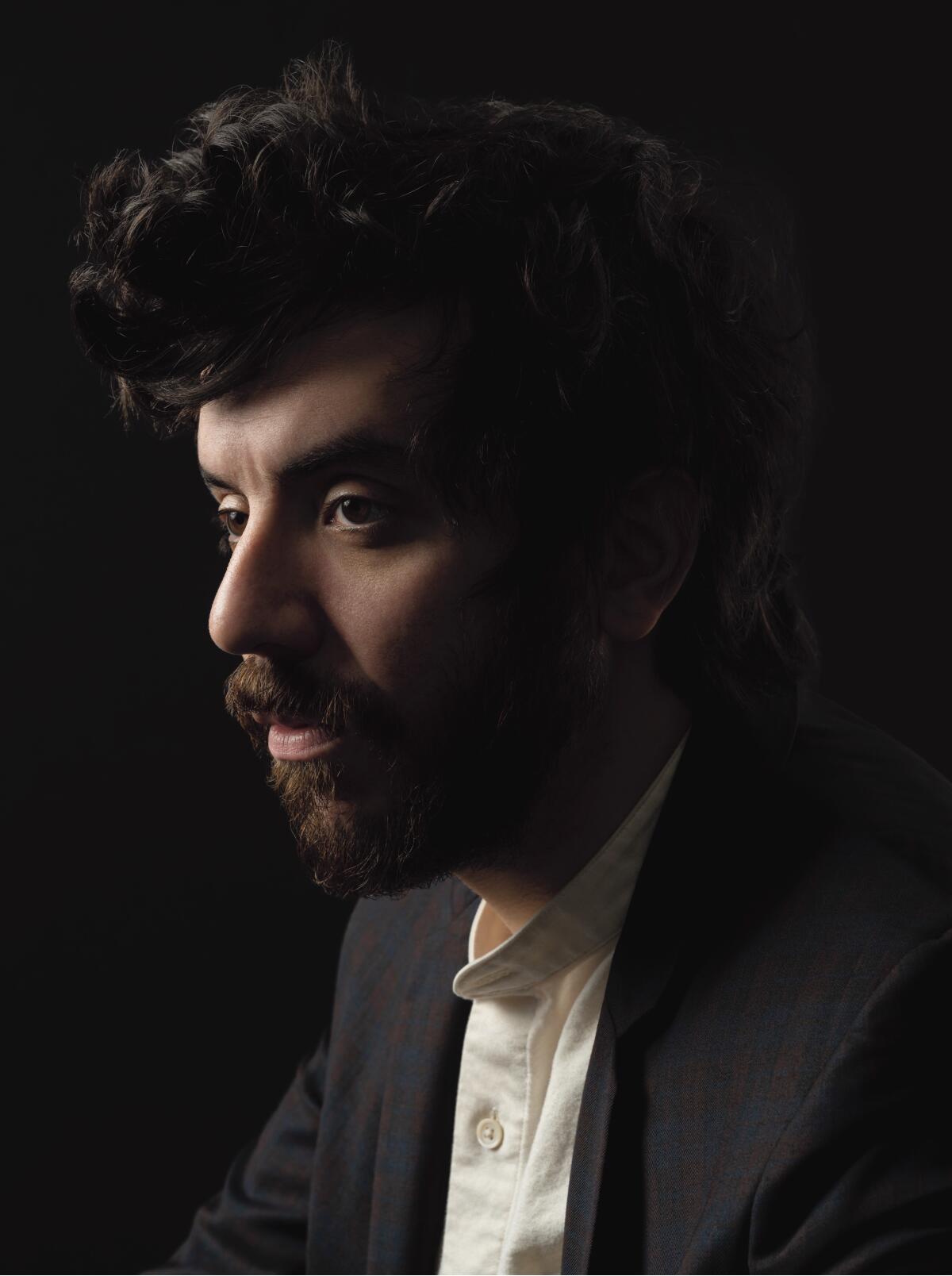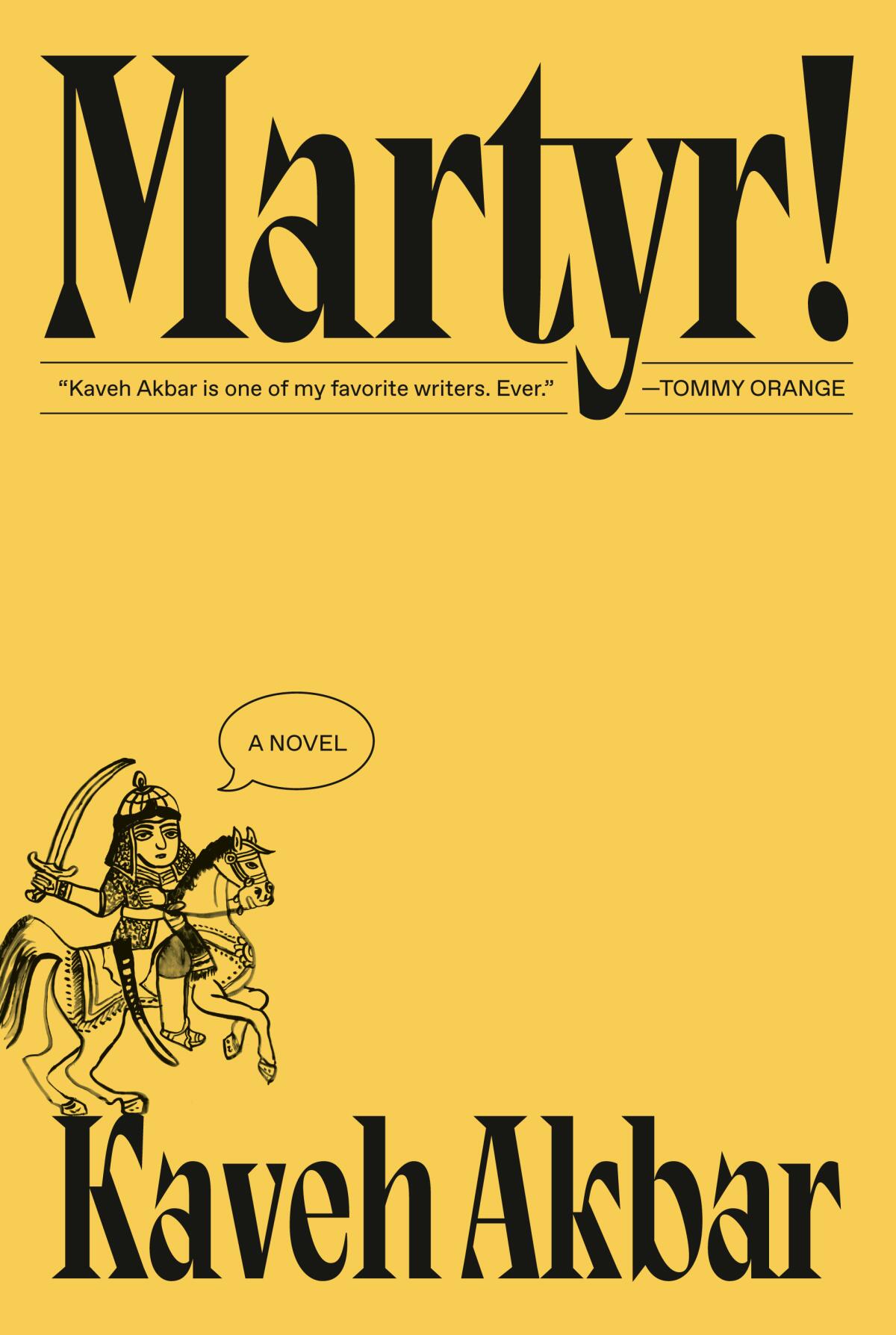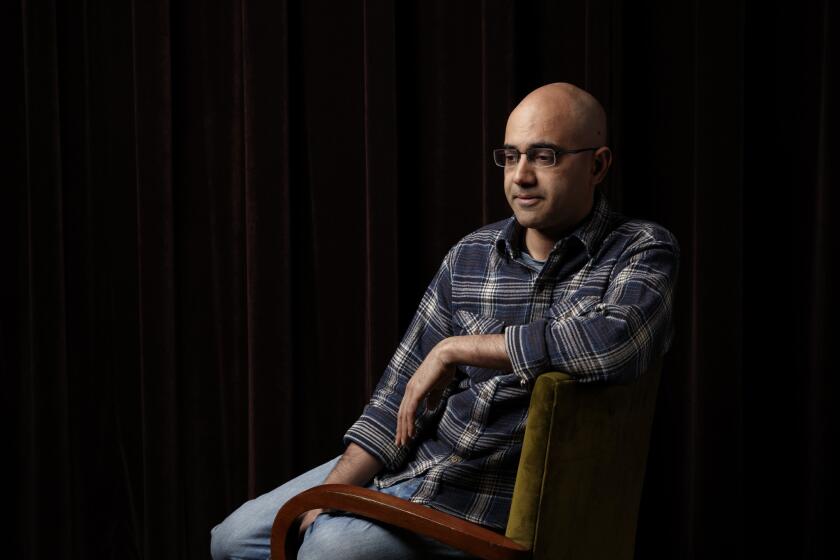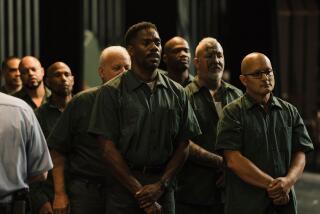Go on, be a ‘Martyr!’ A brilliant debut novel rides the slippery slope of self-sacrifice

Book Review
Martyr!
By Kaveh Akbar
Knopf: 352 pages, $28
If you buy books linked on our site, The Times may earn a commission from Bookshop.org, whose fees support independent bookstores.
If you are a person in recovery or some other kind of crisis, you’re often urged to tell your story. Talk about yourself, because that’s the path to healing. Cyrus, the narrator of Kaveh Akbar’s brilliant debut novel, “Martyr!,” is a talker, almost to a fault.
Cyrus is a 20-something man shaking off years of drinking and drugging by spouting words. He talks to his sponsor. He scrapes by with work training doctors and first responders on improving their bedside manner. He writes poetry about martyrs in an effort to get a grip on Alcoholics Anonymous’ higher power. And he’s not sure any of it works. Is all this talk recovery or narcissism?
When his sponsor asks if he wants to be a martyr himself, Cyrus doesn’t deny it. “Can you imagine having that kind of faith? ... To be that certain of something you’ve never seen? I’m not that certain of anything. I’m not that certain of gravity.” His tone exemplifies the balance Akbar strikes well throughout the novel — steeped in humor and absurdity but deathly serious as well. (The over-the-top exclamation point in the novel’s title gets at it too.)
People in recovery found strength and hope in Matthew Perry’s book about addiction. For many, it’s the memoir that ‘helped keep me sober.’
This martyr business is fraught territory for Cyrus on a number of fronts. He is an Iranian-born man living in the Midwest, where such talk can arouse suspicions of terrorism. It also kicks up unpleasant family lore about his mother’s death in a passenger plane shot down by a U.S. missile, as well as his father’s slow decline into alcoholism after years of dismal labor on a chicken farm.
Cyrus’ crisis is a deep well of riches for Akbar, who contemplates the psychic challenges of recovery from a host of angles. He writes beautifully about addiction’s grip, the way it stokes false confidence: “Before addiction felt bad, it felt really, really good. Of course it did. Magic. Like you were close enough to God to bop him with an eyelash.” (Sobriety, meanwhile, can feel like “nothing. Nothing in every direction.”) There are also the requisite stories about benders, the kind that start with a hunt for drugs and end, somehow, with an ax in somebody’s foot. Akbar makes such stories simultaneously funny and piercing and pathetic.

But “Martyr!” operates on a few levels beyond that. Akbar, a poet himself — his 2017 book “Calling a Wolf a Wolf” is much-acclaimed — employs Cyrus’ poems, whose subjects include Joan of Arc, Bobby Sands, Qu Yuan and his own mother, to explore slippery, abstract quests for identity. Excerpts from this collection-in-progress obsess over the way such figures are puffed up or brought down. (“is it vanity? If it is, then I stand for it,” he writes in an ode to Indian revolutionary Bhagat Singh.) In bed, Cyrus conducts conversations with various famous figures, from the Sufi mystic Rumi to Lisa Simpson to Donald Trump. He’s trying to triangulate a meaningful identity by bouncing like a pinball around a host of others.
Those artsier chats are woven through a more straightforward plot: At a friend’s urging, Cyrus heads to Brooklyn to see Orkideh, an Iranian American artist who is dying and spending her final days as a living museum installation, inviting visitors to sit across from her, à la conceptual artist Marina Abramovic, and chat. Who better to discuss martyrdom with than someone who’s literally turned her death into a performance piece?
The nation is in a strange and angry state, a bruising time of rising populism, anti-immigrant fervor and a searing gap between the rich and everyone else.
A well-concealed plot twist exposes how perfect Cyrus’ interlocutor really is for him. But before that, she’s the cold splash of water in his face, the one who finally undermines his craving for martyrdom with a healthy dose of humility. “You want to die. And you want for that death to be glorious. Like all Iranian men,” she says with a sigh. But she’s calling out a universal narcissism too: “It seems very American to expect grief to change something,” she tells him. “Like a token you cash in.”
Still, Cyrus believes that without a higher purpose, life might be meaningless. (His last name: Shams.) But if martyrdom were so satisfying, cycling through all its variants would have been more reassuring. He recalls an uncle who, while fighting in the 1980s Iran-Iraq War, was tasked with riding through fields of the mortally wounded, lighting his face to give dying soldiers a glimpse of an angel. It’s a gesture Akbar milks for all its poetic power — “If it helps them to see a ball of light riding the wind then that’s what I’ll be” — but it’s ultimately a grimly futile gesture. Is that all martyrdom gets you?
Any good novel balances the unruly mess of human behavior with the ostensible order fiction provides. The strength of “Martyr!” is that Akbar arranges its various messes well and doesn’t strive too hard to reconcile them. By the end, Cyrus is still in recovery, still uncertain, still contemplating what a good death might be. ”It feels like such a throwaway to just die for no reason. To waste your one good death,” he thinks, inverting Mary Oliver’s famous line about putting our one wild precious life to use.
What he does have, though, is a sense that the mess of life should caution us about trying too hard to order it. Martyrdom is ultimately a story somebody tells about us; better to have one to claim for yourself.
Athitakis is a writer in Phoenix and author of “The New Midwest.”
More to Read
Sign up for our Book Club newsletter
Get the latest news, events and more from the Los Angeles Times Book Club, and help us get L.A. reading and talking.
You may occasionally receive promotional content from the Los Angeles Times.








